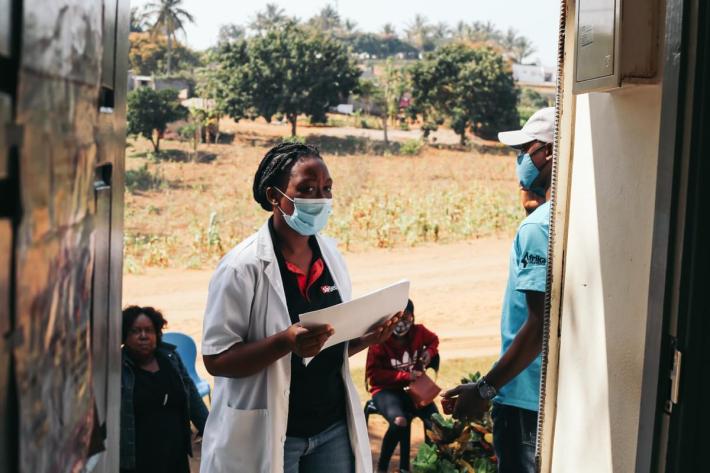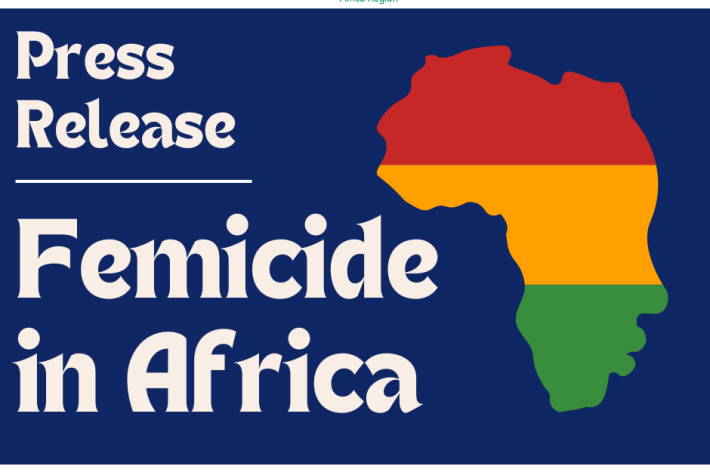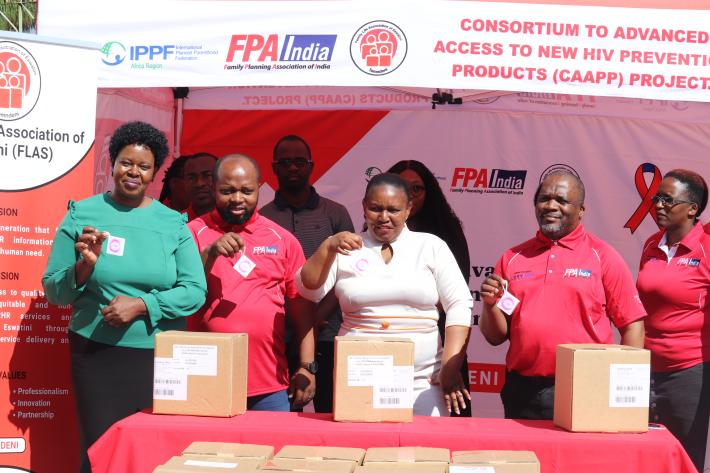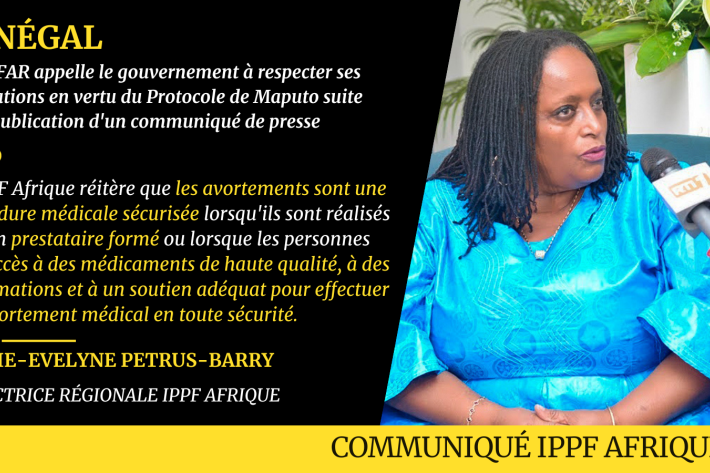Latest press releases
A selection of stories from across the Federation
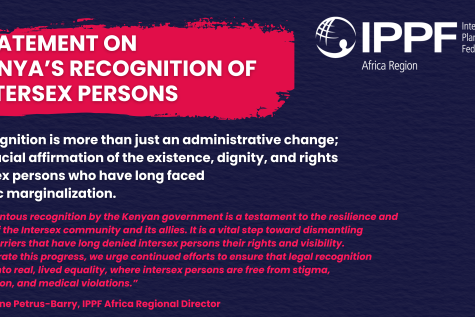
Kenya
IPPF Africa Region Welcomes Kenya’s Landmark Recognition of Intersex Persons
IPPF Africa Region Welcomes Kenya’s Landmark Recognition of Intersex Persons Nairobi, Kenya: 13 February 2025 – On 31 January 2025, Kenya has taken a groundbreaking step towards inclusivity and human rights by officially recognizing intersex as a sex marker alongside male and female in the Kenya Legal Notice 153 of 2025.


| 13 February 2025
IPPF Africa Region Welcomes Kenya’s Landmark Recognition of Intersex Persons
IPPF Africa Region Welcomes Kenya’s Landmark Recognition of Intersex Persons Nairobi, Kenya: 13 February 2025 – On 31 January 2025, Kenya has taken a groundbreaking step towards inclusivity and human rights by officially recognizing intersex as a sex marker alongside male and female in the Kenya Legal Notice 153 of 2025. This marks a significant policy shift that affirms the dignity and rights of intersex persons from birth. The International Planned Parenthood Federation Africa Region (IPPFAR) welcomes this milestone, which reflects the tireless efforts of intersex persons, activists, and allies who have long advocated for legal recognition. By including intersex in official documentation, Kenya is addressing years of systemic marginalization and laying the foundation for greater visibility and protection. This recognition is more than just an administrative change; it is a crucial affirmation of the existence, dignity, and rights of intersex persons who have long faced systemic marginalization. Societal stigma has forced many to conceal their identities, leading to a lack of public awareness, inadequate medical support, and legal invisibility. The extent of this invisibility is reflected in official data—while the 2019 census recorded only 1,524 individuals as intersex, the Kenya National Commission on Human Rights estimates the actual population could be as high as 1.4 million. The significance of this recognition is deeply felt within the Intersex community. Andy Maxwell, an intersex activist and Executive Director of Q We Rise Network expressed the overwhelming joy and validation this brings: “Finally, we can have our identity reflected on our identification documents. We are also incredibly excited about this victory, especially at a time when it felt like our efforts were being challenged.” Marie-Evelyne Petrus-Barry, IPPF Africa Regional Director, said: "This momentous recognition by the Kenyan government is a testament to the resilience and advocacy of the Intersex community and its allies. It is a vital step toward dismantling systemic barriers that have long denied intersex persons their rights and visibility. As we celebrate this progress, we urge continued efforts to ensure that legal recognition translates into real, lived equality, where intersex persons are free from stigma, discrimination, and medical violations". While legal recognition is a milestone, intersex individuals continue to face violations of bodily autonomy through forced medical interventions. Non-consensual procedures, often performed in infancy or childhood to fit binary norms, cause lasting physical and psychological harm. True inclusion requires not only recognition but also strong protections against these harmful practices, ensuring intersex persons have full control over their own bodies. “RHNK applauds the Kenyan government for this historic step in recognizing the rights and dignity of intersex persons. As an organization committed to advancing inclusive sexual and reproductive health rights and strengthening healthcare access, we emphasize the need to ensure that this recognition also leads to equitable, stigma-free and gender affirming healthcare services. Every intersex person deserves the right to bodily autonomy and access to non-discriminatory medical care”, said Nelly Munyasia, Executive Director, Reproductive Health Network Kenya, IPPFAR’s Associate Member in country. IPPFAR is committed to advancing intersex rights by working with communities, policymakers, and healthcare providers through Reproductive Health Network Kenya. While legal recognition is progress, ensuring meaningful protections and rights-based healthcare remains essential on the path to full equality. END For further information or to request an interview, please contact: -Mahmoud GARGA, Lead Strategic Communication, Voice and Media, IPPF Africa Regional Office (IPPFAR) – email: [email protected] / Tel: +254 704 626 920 ABOUT IPPF AFRICA REGION (IPPFAR) The International Planned Parenthood Federation Africa Region (IPPFAR) is one of the leading sexual and reproductive health (SRH) service delivery organization in Africa, and a leading sexual and reproductive health and rights (SRHR) advocacy voice in the region. Headquartered in Nairobi, Kenya, the overarching goal of IPPFAR is to increase access to SRHR services to the most vulnerable youth, men and women in sub-Saharan Africa. Supported by thousands of volunteers, IPPFAR tackles the continent’s growing SRHR challenges through a network of Member Associations (MAs) in 40 countries. We do this by developing our MAs into efficient entities with the capacity to deliver and sustain high quality, youth focused and gender sensitive services. We work with Governments, the African Union, Regional Economic Commissions, the Pan-African Parliament, United Nations bodies among others to expand political and financial commitments to sexual and reproductive health and rights in Africa. Learn more about us on our website. Follow us on Facebook, Instagram and YouTube.

| 05 February 2025
The DRC: IPPFAR Calls for Immediate De-Escalation of Conflict, Establishment of Humanitarian Corridor, and Protection of Women and Girls
Nairobi, Kenya: 5 February 2025 – The International Planned Parenthood Federation Africa Region (IPPFAR) calls for an immediate de-escalation of the conflict in the eastern region of the Democratic Republic of the Congo (DRC) and the immediate establishment of humanitarian corridors to ensure unimpeded access to lifesaving aid, including sexual and reproductive health and rights (SRHR) services. The situation in eastern DRC has deteriorated catastrophically following the capture of Goma by M23 armed groups between 26 and 29 January 2025. IPPF has received distressing reports of widespread suffering, with thousands of civilians trapped and deprived of essential humanitarian assistance, including access to sexual and reproductive healthcare. At least 900 people have been killed, nearly 3,000 injured, and countless others displaced, forced to seek refuge in overcrowded churches, schools, and temporary shelters, where their safety remains precarious. IPPF’s partners in the DRC report the destruction of aid and healthcare facilities, looting by armed groups, and the evacuation of United Nations and humanitarian INGO staff, leaving civilians at heightened risk of sexual violence, unintended pregnancies, sexually transmitted infections (STIs), and food insecurity. “We are witnessing a humanitarian catastrophe, with hospitals inaccessible and humanitarian access blocked, pregnant women and survivors of sexual violence have nowhere to turn. Maternal services, emergency contraception, post-rape care, and safe abortion services are entirely out of reach, leaving thousands of women and girls facing forced pregnancies, sexually transmitted infections, and lifelong trauma” said Marie-Evelyne Petrus-Barry, IPPF Africa Regional Director. IPPF’s in-country partners are not able to fully resume all Sexual and Reproductive Health in Emergencies (SRHiE) services, referrals, and psychosocial support due to safety concerns for their healthcare workers and shortage of commodities. The organization is calling for the urgent establishment of a protected humanitarian corridor to ensure the delivery of lifesaving care, particularly for those subjected to sexual violence. "Conflict shatters lives and denying access to sexual reproductive health and rights only exacerbates the suffering, deepens inequalities, and robs people—especially women and girls—of their dignity and future. These are fundamental human rights, and are as critical as food, water, and shelter in times of crisis", added Marie-Evelyne Petrus-Barry, IPPF Africa Regional Director. “Goma is harbouring over 400.000 Internally displaced people that have scattered due to the clashes between the DRC army and M23. Women and children remaining have once again been victims of violence and could face sexual violence historically used as a weapon of war against civilian. The international community must prioritise women and children's needs and take decisive actions to prevent atrocities to unfold. We must ensure that the most vulnerable are at the heart of our response, and, most importantly, we must work to prevent sexual violence from happening in the first place", said Valerie Dourdin, IPPF Global Humanitarian Director. IPPF urges regional leaders, the international community, and UN agencies to take immediate action to: End the violence, with all parties ceasing their offensive and an immediate end to the targeting of civilians, in line with international humanitarian law. Guarantee humanitarian access and safe, unhindered delivery of essential aid, including emergency SRH services, post-rape care, and safe abortion access. Protect women and girls with a zero-tolerance approach to sexual violence, with justice and accountability for perpetrators. Ensure safe refuge and immediate protection for displaced persons, with neighbouring countries urged to accept and support refugees. Restore healthcare services and the immediate re-establishment of essential healthcare and SRH services to support affected communities. Protect healthcare workers and facilities by implementing measures to ensure their safety and put an end to attacks on frontline responders. IPPF remains committed to advocating for the rights and dignity of those affected by the ongoing conflict and will continue working with its Member Associations to restore access to life-saving humanitarian SRH services in the Eastern DRC and neighbouring countries. END For further information or to request an interview, please contact: -Mahmoud GARGA, Lead Strategic Communication, Voice and Media, IPPF Africa Regional Office (IPPFAR) – email: [email protected] / Tel: +254 704 626 920 - Hanna Lund Adcock Senior Humanitarian Communication Adviser, IPPF Global Humanitarian Team – email: [email protected] / Tel: +44 773 792 49 15 ABOUT IPPF AFRICA REGION (IPPFAR) The International Planned Parenthood Federation Africa Region (IPPFAR) is one of the leading sexual and reproductive health (SRH) service delivery organization - in normal and humanitarian situations- in Africa, and a leading sexual and reproductive health and rights (SRHR) advocacy voice in the region. Headquartered in Nairobi, Kenya, the overarching goal of IPPFAR is to increase access to SRHR and SRHiE services to the most vulnerable youth, men and women in sub-Saharan Africa. Supported by thousands of volunteers, IPPFAR tackles the continent’s growing SRHR and SRHiE challenges through a network of Member Associations (MAs) in 40 countries. We do this by developing our MAs into efficient entities with the capacity to deliver and sustain high quality, youth focused and gender sensitive services. We work with Governments, the African Union, Regional Economic Commissions, the Pan-African Parliament, United Nations bodies among others to expand political and financial commitments to sexual and reproductive health and rights in Africa. Learn more about us on our website. Follow us on Facebook, Instagram and YouTube.











